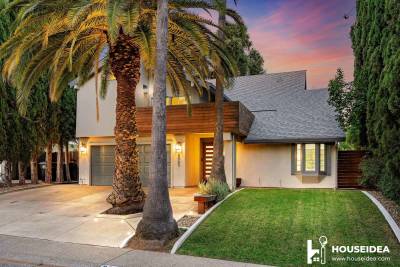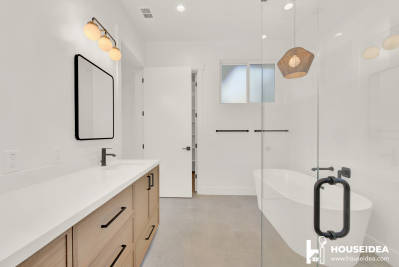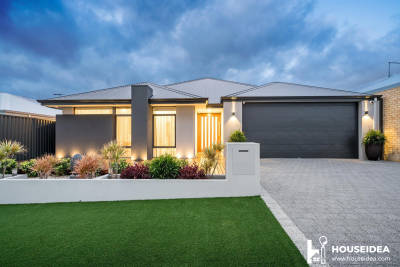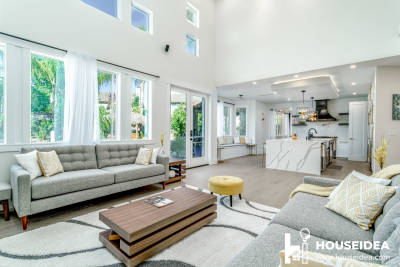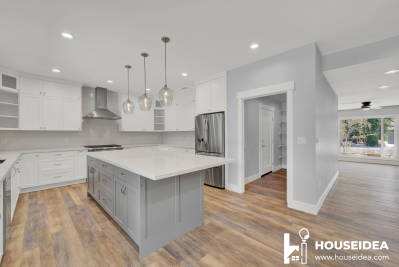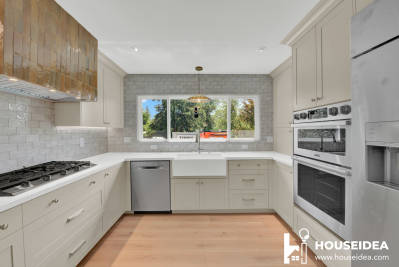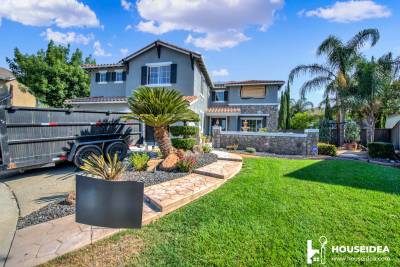The sun's energy has been harnessed by mankind for various purposes over the centuries. In modern times, solar technology has taken a big leap forward, with solar panels becoming a common sight on rooftops around the world. If you're considering a switch to this renewable energy source, here's a comprehensive guide on solar panel installation.
Understanding Solar Panels
Solar panels are devices that convert sunlight into electricity. They are composed of small, square-shaped cells made from materials that possess a property called the ‘photoelectric effect’. This property allows the cells to absorb photons (light particles) and release electrons, thereby generating electricity.
Types of Solar Panels
Before delving into the process of solar panel installation, it's crucial to understand the types of solar panels available in the market.
- Monocrystalline Solar Panels: These are made from a single crystal structure and offer the highest efficiency rates as they are made out of the highest-grade silicon.
- Polycrystalline Solar Panels: These panels are made from silicon fragments melted together. They’re not quite as efficient, but they offer a good balance of price and performance.
- Thin-Film Solar Panels: These are made by placing one or more films of photovoltaic material (such as silicon, cadmium, or copper) onto a substrate. They are easier to produce, but require a lot more space.
The Process of Solar Panel Installation
Now let's walk through the step-by-step process of how to install solar panels.
Determining Energy Needs
The first step in solar panel installation involves evaluating your energy needs. Check your electricity bill to see how many kilowatts of electricity you use per day. This will help you calculate the number of solar panels you would need to meet your energy demands.
Finding a Suitable Location
Solar panels need to be installed in a location that gets maximum sunlight throughout the year, usually a roof or an open plot. They should ideally be facing southward, and should not be obstructed by trees or tall buildings.
Choosing the Right Solar Panel
Based on your energy needs and the available location, choose a type of solar panel that aligns with your requirements and budget. Also, keep in mind the longevity and efficiency of the panel.
Hiring Professionals
The installation of solar panels is not a DIY project and requires professional assistance for safe installation and maximum effectiveness. Choose a reliable solar installer who has experience in solar panel installation.
Installing the Solar Panel System
The installer will mount the solar panels on the chosen location, install the inverter, and wire up the system. This process typically takes one to three days.
Connecting to the Grid
Once the system is set up and tested, it can be connected to your home's electricity system and to the grid, if desired. This is usually handled by your installer, who will also take care of the necessary permissions required to connect to the grid.
Cost of Installing Solar Panels
While the initial cost of solar panel installation can be high, it is a long-term investment that will pay for itself over time as the savings on energy bills start accumulating. Moreover, many countries offer incentives and subsidies for solar installation, which can significantly bring down the cost.
Maintenance of Solar Panels
Solar panels are low-maintenance devices. Regular cleaning to remove dust and checking for any damage are generally adequate for maintaining them. Most solar panels come with 25-30 years of warranty, so you can be guaranteed of their longevity.
In a world grappling with climate change, solar panels offer an effective way to reduce our carbon footprint and achieve sustainability. Solar panel installation could very well be your first step towards a greener, cleaner future.
FAQs About Solar Panel Installation
Why should I consider solar panel installation?
Installing solar panels at your home or business allows you to harvest clean renewable energy directly from the sun. Solar energy can drastically reduce your electricity bills and protect you against future increases in energy prices. With solar panels, you also move towards a greener, more sustainable life, reducing your carbon footprint.
How much area is required for solar panel installation?
The amount of space needed for solar panel installation greatly depends on your energy consumption and the efficiency of the panels. In general, most residential solar panels need a space of around 400 square feet for every 5kW of solar panels. An expert solar installer can help you determine the exact dimensions based on your specific needs.
Does my roof need to be a certain type for solar panel installation?
Solar panels can be installed on most roofing materials, including composite, wood, cement tile, tar and gravel, and more. The primary considerations for successful solar panel installation are roof strength, pitch, and shading. A professional solar installer can assess your roof and advise you if any adaptations are necessary.
How long does solar panel installation take?
From the initial consultation to having a fully operational solar energy system can take anywhere between 1 to 3 months. The actual installation of the solar panels often takes only a day or two. The rest of the time is typically spent in site inspections and permitting.
What happens during a solar panel installation?
The installation process starts with a consultation with a solar professional to discuss your energy needs and inspect your property. After site assessment and designing a suitable solar power system, the solar company will file for necessary permits. Once the permits are approved, the actual physical installation of the solar panels will happen. After installation, there will be an inspection before the system can be turned on.
How long do solar panels last after installation?
Most modern solar panels are designed to last between 25-30 years, but this doesn't mean they stop producing electricity after that period. It just implies that energy production has declined by what manufacturers consider a significant amount. Many solar panels continue to operate and provide clean energy for many more years after their 'official' lifespan.
Can I install solar panels myself?
While DIY solar panel installation presents an opportunity to save on the cost, it’s essential to consider the technical expertise required. Installing solar panels involves complex procedures like electrical wiring and mounting panels, which can have risks if not conducted properly. Without professional training, you could potentially damage the equipment, your roof, or even yourself.
What is the maintenance required post solar panel installation?
Solar panels generally require little to no maintenance, especially if they are installed at the right angle as rain helps to keep them clean. However, it's still essential to get them inspected annually by a professional to ensure optimum functioning. If the panels are installed in a dusty area, they may need more frequent cleaning to maintain efficiency.
Can I install solar panels if my roof is shaded?
For maximum efficiency, solar panels need as much direct sunlight exposure as possible. If your roof is heavily shaded, it might limit the effectiveness of the panels. However, multiple options might still allow you to go solar, such as tree trimming, installing panels on a different part of the property, or even using high-efficiency solar panels. A solar installer can provide the best advice based on your situation.
What happens to solar panels during a power outage?
For safety reasons, most solar power systems are designed to shut off during power outages if they are grid-tied. However, if your system includes a battery storage option, you can still have power even when the grid is down.
Pros and Cons of Solar Panel Installation
Pros of Solar Panel Installation
Renewable Energy Source
One of the most significant advantages of solar panel installation is that it provides a renewable source of energy. Solar energy can be harnessed in all areas of the world and is available every day. Unlike some other energy sources, we can't run out of solar energy.
Reduces Electricity Bills
- You'll meet some of your energy needs with the electricity your solar system has generated, which will result in significant energy savings. How much you save will depend on the size of the solar system and your electricity usage.
- Moreover, not only will you be saving on the electricity bill, if you generate more electricity than you use, the surplus will be exported back to the grid and you'll receive bonus payments for that amount.
Diverse Applications
Solar energy can be used for many applications. You can generate electricity in areas without access to the energy grid, distill water in regions with limited clean water supplies, and power satellites in space. It can also be integrated into the materials used for buildings.
Low Maintenance Costs
Solar panel installation generally does not require a lot of maintenance. After installation, you just need to ensure they are kept relatively clean and check no trees are overshadowing the panels.
Cons of Solar Panel Installation
Dependent on Weather
While solar energy can still be collected during cloudy, rainy, or snowy days, the efficiency of the solar system does drop. Solar panels depend on the sun, and if the weather is consistently bad, it can impact the effectiveness of the solar energy system.
High Upfront Costs
- The initial cost of purchasing a solar system is reasonably high, particularly if you are looking to substitute all or a significant chunk of your energy needs.
- This includes paying for solar panels, inverter, batteries, wiring, installation, and labour costs. However, solar technology is constantly improving, so it's safe to expect that prices will drop in the future.
Requires a Lot of Space
The more electricity you want to produce, the more solar panels you will need. This can be a drawback if you have a small roof or want to produce a lot of power. Some additional solar panels can also be installed, but they tend to be very expensive.
Associated with Pollution
While solar panels are generally considered a form of green energy, there is some pollution associated with the production and installation of solar photovoltaic systems. The transportation and installation of solar panel systems have been linked to the emission of greenhouse gases. Some solar panel manufacturing processes are also associated with the use of hazardous materials.
Summary
The process and benefits of solar panel installation can't be ignored. This green technology not only helps to save money on monthly electricity bills but also reduces the dependency on fossil fuels. Solar energy is a renewable, clean energy source that contributes to a sustainable future for our planet and future generations.
Solar panel installation isn't just great for the environment, it's also an smart way to improve the value of your property. As more and more homeowners are attracted to sustainable living and low-cost energy solutions, properties with solar panel systems are likely to have an edge in the real estate market. So, besides the financial savings from lower energy costs, homeowners can also enjoy the added value to their home.
Overall, solar panel installation represents a significant step towards harnessing renewable energy. With the ongoing advancements in solar technology, this form of energy is becoming more efficient and affordable for everyday use. It's clear that solar panels have a lot to offer, both to individual homeowners and to our planet as a whole.
About HouseIdea
Welcome to HouseIdea! Nestled in the heart of Sacramento, CA, we believe in turning houses into homes, one idea at a time. With a passion for design and creativity at our core, we assist our clients in transforming their spaces into sanctuaries of comfort and personal expression. The unique blend of our modern Californian aesthetics, combined with a keen eye for detail, is embedded in every project we handle. Whether you're considering a complete remodel, or just need some guidance to refresh your space, HouseIdea is your trusted partner for all your interior design needs.
Tags: Solar Energy, Renewable Energy, Sustainable Living,












